
"You know, when I did it, I thought it just made sense," said former New York Knick, senator, and presidential hopeful, Bill Bradley. "I was desperate. I had to do something. So, I did it. I had no idea what I was doing would become so controversial, so ground-breaking, let alone be named an 'Effect' that pundits and politicians still talk about to this day. My goodness, people, that was 1963."
Indeed, with the historic Obama campaign for the U.S. presidency, all the media is awash with cautionary tales about the "Bradley Effect" and how it could possibly change this election. Little did the highly-touted Princeton small forward know that his actions would still be talked about some 45 years later.
"No," Bradley told Tome in a recent interview, "as I said, I was desperate. Harvard had this monster center at the time, Lucious Washington. Any time I'd go to the lane and pull up to take a shot, Washing would just swat it away. It was infuriating. I just couldn't score on the big guy."
Those were still the days of the set shot. A player would drive with the ball, pull up, and, with feet firmly planted on the parquee, take a shot. While Bill Russell and Walt Chamberlain were slam dunking in the NBA, players still could not fathom the 30-foot jumper.
"You had a lot of convoluted racial theories at the time," Bradley continued. "Asians were shifty and lazy and no good at math; blacks were lazy and shifty and couldn't ice skate, swim, or vote; and white men couldn't jump."
The last was an unwritten law in basketball enforce ruthlessly by the Ku Klux Klan. Joshua "Shooter" Schwartz of the Rochester Royals was lynched after a game in Minneapolis in 1946 for attempting a jump shot (or "the Hottentot hop," as it was called). The message was sent, and white men in neither college nor the pros no longer attempted to leave their feet as they took a shot.
That ban lasted for almost 20 years. As legend has it, on February 27, 1963, during the Princeton-Harvard game, the Bradley Effect changed the course of human history. Princeton was down by a single point with four seconds left in the game. Bradley got the ball at the top of the key, only to be met by the center, Washington, who'd already rejected 12 of his shots that evening.
"I don't know what came over me," Bradley confessed. "I just didn't want to lose, and, before I knew it, my feet left the ground and the ball, my hands. You could hear the whole auditorium gasp. We all thought I was a dead man."
The ball, of course, sailed over the seven-foot Washington, and Princeton won the game 32-31. While no one killed or beat the young Bradley, there were death threats. And the shot caused hysteria among sports journalists. Bradley became a (very high-scoring) pariah. "That boy couldn't even run for dog catcher in this town," famously quipped legendary sportswriter, Blackie Sherrod. Notorious white supremacist George Lincoln Rockwell called Bradley "a closet nigra."
"Any time you challenge people's pre-conceived notions, there will be resistance, sometimes even violence," Bradley stated, "but there was no way I was giving up that jump shot. Because of the Klan, none of the white guys would jump up to defend it. Racism really does victimize all races."
Bill Bradley went on to average 27.3 points and 12.2 rebounds per game at Princeton (once scoring 58 points against Wichita St. in the 1965 NCAA tournament). He was a three-time All-American and the 1965 National Player of the Year. He went on to help Olimpia Milano win the European Champions Cup in '66, the Knicks win the NBA championship in '73, and was inducted into the Basketball Hall of Fame in 1983.
Other white players went on to adopt the jump shot, and scoring increased some 300 percent. Despite this, it was not until 2002 when whites cleared the final racial hurdle in basketball, the slam dunk (German transplant Dirk Nowitzki in a game against Detroit). However, the Bradley Effect has had far-reaching effects felt far outside the realm of basketball.
"Well, Willie O'Ree desegregated teh NHL up in Boston," Bradley boasted. "But what makes me proudest of the Bradley Effect is how it precipitated social change: the independence movements in Africa and Asia; all the Civil Rights legislation of the '60s and '70s; America finally opening up our borders to Latinos, Africans, and Asians. None of that would've been possible without my jumper. You know, MLK himself once thanked me for taking that shot. He said it opened up so many opportunities for blacks and whites alike."
Bradley teared up.
"I'm so glad I took that jumper. The Bradley Effect has been such a force for positive change in the world--they reportedly threw basketballs at the Berlin Wall to help tear it down--and now it may just elect the first African-American president. And to believe all I wanted to do was score on that bastard, Lucious Washington."
Sunday, November 2, 2008
Bill on the Bradley Effect
Labels:
bill bradley,
the bradley effect
Subscribe to:
Post Comments (Atom)










1 comment:
Ha! That was a good one. I had the opportunity to spend time with Bill Bradley a few times in the 1980s. I'd always tell people that if I could appoint the president of the United States, he'd be my pick.
Post a Comment